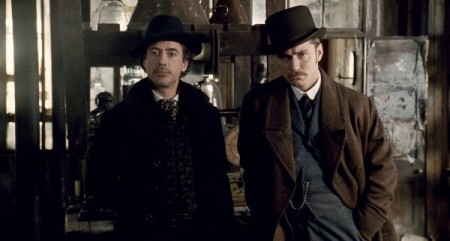Overall Impression – Unmemorable fun with a smattering of man love, a dash of anti-Semitism, and a mean hook.
THE FOUR QUESTIONS
Who’s your main character? – Sherlock Holmes.
What’s he trying to accomplish? – Professional: Stop Lord Blackwood. Personal: Cope with the impending marriage of Watson. Private: Learn that emotion and feeling is just as important as thinking and logic.
Who’s trying to stop him? – Lord Blackwood.
What happens if he fails? – Holmes, Watson, and Irene Adler will get killed, and the world will be taken over by a crazed genius.
THE FOUR ARCHETYPES
Orphan – Holmes lives the life of a recluse which is made worse by the fact that his trusted friend, Watson, is moving out to get married. Nothing intrigues him or confounds him, and he resorts to various diversions to keep himself entertained: predominantly opium and bare-knuckle fighting.
Wanderer – Holmes is called upon to solve the mystery of Lord Blackwood, an aristocrat heavily involved in mysticism who was hanged and has now seemingly risen from the grave. He is also reunited with the pretty con-artist, Irene Adler who has a case for him.
Warrior – Holmes is brought to Lord Blackwood’s father who tells him about the secret society that his son is involved with. Holmes now fights to stop Lord Blackwood, reluctantly teaming up with the shady and untrustworthy Irene whom he knows has a secret employer.
Martyr – Holmes works with Inspector Lestrade and is brought before one of the more powerful members of the secret order Blackwood controls. Holmes escapes and together with Watson and Irene risk their lives to save Parliament and defeat Blackwood.
AND, IN THE END…
Sherlock Holmes is a perfect studio movie; which is to say that it’s completely unwritable and unsellable by an aspiring writer.
Aspiring writers don’t have the clout or the access to sell this kind of story. No matter how well written a spec Sherlock Holmes script may be, is the world clamouring for another Holmes story? No. What got people excited about this Sherlock Holmes story was both the reimagining of Holmes as a drug-using action hero and the one actor in Hollywood who could play this Holmes: Robert Downey, Jr. This was the right actor, in the right movie, at the right time. For aspiring writers, this type of planetary alignment just doesn’t happen.
As a script, Sherlock Holmes is serviceable. I don’t know that there’s anything in particular one can learn from its structure or execution that can’t be learned better elsewhere. As an object lesson in the business of writing stories however, Sherlock Holmes is very informative.
Look at the stories you are working on. Ask yourself what it is about them that’s going to get people excited? If you don’t have the access or the clout to deliver those elements, you may want to rethink your business plan.
Oh, and another thing; if you’re a gifted director who’s recently ended a multi-year relationship with a wacky, Kabbalah-spouting spouse, go easy on the negative associations with Jewish iconography in your movies. One doesn’t have to be Sherlock Holmes to figure out what you’re thinking.
– Jeffrey Alan Schechter


One Response to “SHERLOCK HOLMES”